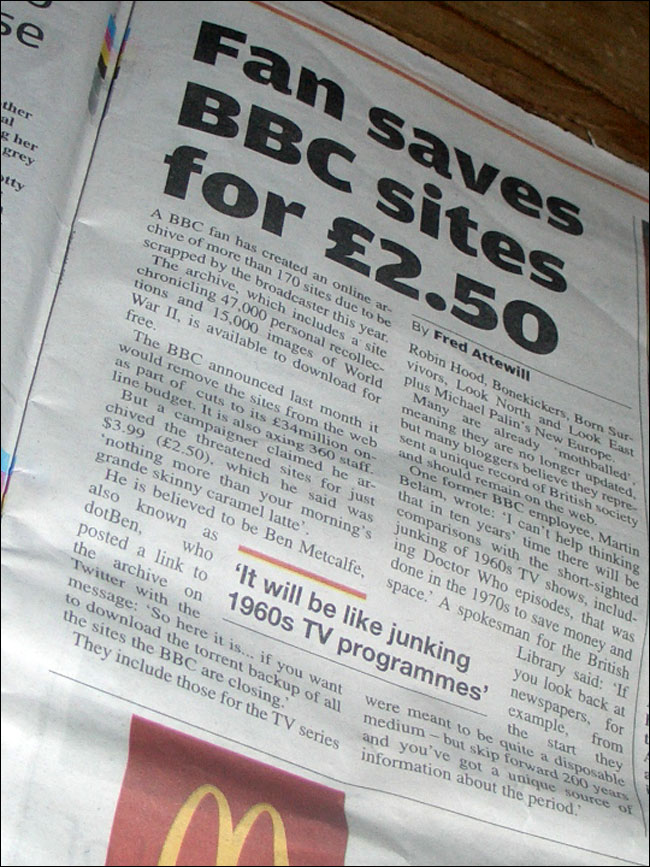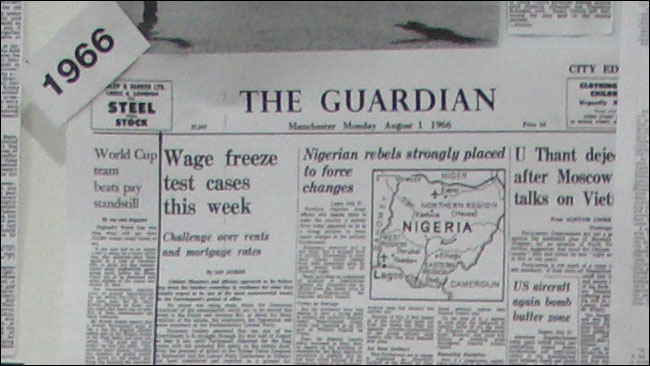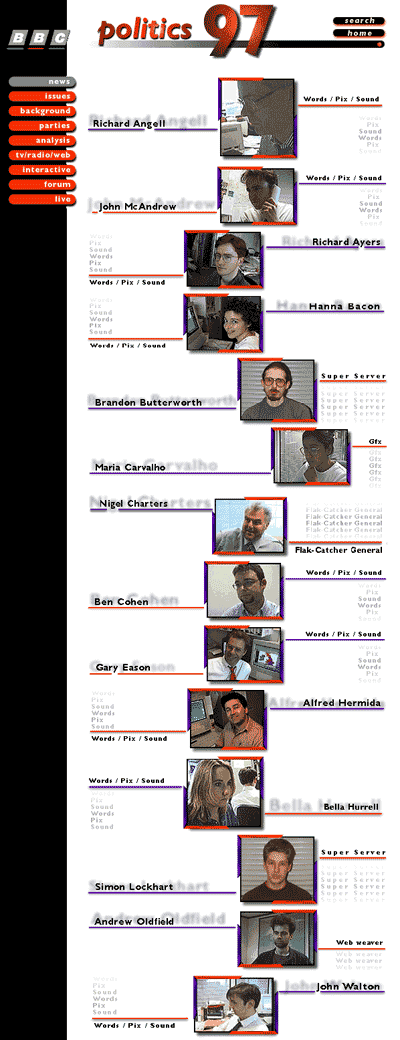The great BBC website massacre - the BBC replies to criticism
There has been continued fall-out from the BBC's decision to announce the closure of nearly 200 websites. The headline grabbing figure masked the fact that a lot of the sites were already 'mothballed', and represents the potential destruction of some uniquely valuable online content.
Several people have blogged about it, including the 853blog and Jeremy Keith. One anonymous person set up a spider specifically to crawl the doomed content, and is offering it for download via a torrent file, estimating the cost of doing so to be $3.99. This figure prompted the story to reach Metro, in an article by Fred Attewill which quoted this blog.

This Metro article about the deletion of BBC websites quoted this blog.
Romney left an interesting comment on my last blog post on the subject, stressing that the expectation that archives should preserve everything is a relatively new phenomena due to the emergence of digital technology:
“Just because it is financially possible now to preserve everything online (as it wasn't with the cost of tape for programmes in the 60s), it doesn't mean it should be. In any archive there should be weeding in the public collections, to take out the rubbish and refresh content. Archiving privately is not the same as deleting. Librarians and Archivists have been weeding collections for decades, but I guess it is a new concept to people used to the internet and almost infinite storage. I do like /cult, but there are plenty of other resources out there now that cover similar ground, so I'm not going to miss it terribly. We only care about a handful of programmes from the 60s that we continue to think are great (Doctor Who, Not Only But Also, Top Of The Pops, etc). That's a tiny minority of the output. There was a lot of barely watchable dross deleted that no one cares about, and a whole lot of mediocrity preserved that will never be broadcast again because well, its worthy but boring. That's the reality of archives”
In a new blog post yesterday from the BBC about the archive deletion, Ian Hunter makes the point that even though Guardian content from 1999 is still available online, it is no longer presented in the way it was on Guardian Unlimited.
I wrote about this last summer, when the Guardian library team put up a “Wall of World Cup Archives”, showing how the paper had covered the post-war tournaments. I contrasted it to the incomplete digital World Cup archives, where CMS migrations have altered the look and feel of the pages. Apart from anything else at all, the printed archive contains contemporary advertising, whereas when you look any web page on our site, regardless of the publishing date, you get served current campaigns.

This replica of The Guardian in 1966 features the original advertising in the masthead.

The job adverts on this screengrab represent a rare exception to the rule that advertising across guardian.co.uk always features current campaigns.
The BBC sites under threat are of various levels of cultural merit, and it should be noted from Hunter's blog post that:
“Many have argued that www.bbc.co.uk/ww2peopleswar should remain accessible to a wide audience. Again, this is an example of a site we are looking to consolidate into a bigger product - in this case the history section of knowledge and learning. Similarly, assets from many of the 170 sites will be re-presented in forms which can be more easily kept up to date. For instance, www.bbc.co.uk/hamlet has been superseded by http://www.bbc.co.uk/programmes/b00pk71s and placed into a format which will allow the data and assets to be refreshed or editorially changed going forward. The same has been done with www.bbc.co.uk/annefrank.”
Nevertheless, even if all the content is re-purposed or preserved offline, valuable content will, in my view, unecessarily disappear from easy public view. There might not be much of a lament over bbc.co.uk/zombies, but Politics 97 is to my knowledge the only UK news website from 13 years ago that you can see almost exactly as it originally appeared, and the only one that could possibly still be preserved in that state. So why not keep it, complete, as it is, with the TV style credits to the people that made it?

60s TV progs like Dr Who are an interesting example - because whilst we might value them now, in the 70s they were considered unimportant and junked wholesale. A lot of effort went into their partial recovery. It's very difficult to envisage what future generations will value as concerns change over time.
I like that the photo of Brandon appears to capture him in Max Headroom style. Legend.
I had a great tour of the physical BBC archive at Windmill Road once, and was stuck that for some long-running shows of 'low' merit like The Weakest Link, the archivists keep selected representative episodes. I thought at the time that I'd hate to be the person who failed to have chosen the episode featuring someone who goes on to be a celebrity or a serial killer...
In reply to Matt Moore, a very valid point, however archiving them privately is not the same as deleting them, they are just not available online, should the content become relevant/valuable again the archives can be revisited and information reposted where desirable. I agree that just because it is possible to preserve everything online, doesn't mean it should be